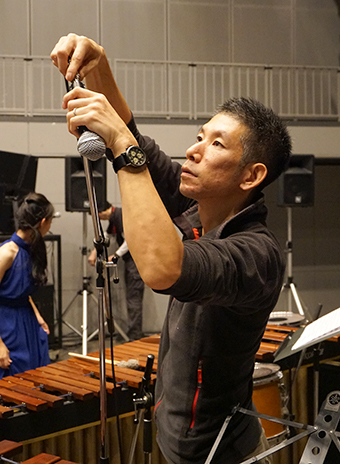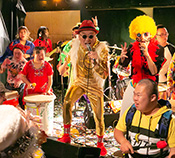Bringing Smiles to People’s Faces—Joy with Music.
(Part 1)
Wataru Tanaka / Sound Engineer
All This for the Cycle of Joy.
A sound engineer brings music and its audience together. For Wataru Tanaka, who tells us that “carrying” music is more fun than playing it, life with music is a constant pursuit of emotional richness. We ask Wataru, a first-time father, to tell us more about himself.
Sound engineering was more interesting to me than playing guitar.
I remember first experiencing music at the age of 5 or 6. I would put records from around the house—La Bamba, The Beatles—onto the record player and just listen to them. The records were a great pleasure, but my intense love for music came later. I dived into music deeply from high school, when I joined a pop music club and started playing guitar. What drew me to pop music now escapes me, but my interest shifted to jazz after entering the club. Jazz guitarists like Joe Pass and Pat Metheny obsessed me.
My encounter with sound engineering came at around the same time. In our pop music club we didn’t hire professionals to engineer the lighting and sound. We did it all on our own. We still had to rent our equipment from professional sound engineers, of course, so we helped them with their work in return for discounted rates on the equipment. I first witnessed sound engineering in action working for them. Most people think that performing on stage is more fun and exciting than handling the technical stuff backstage. For me, sound engineering had a lot more appeal. That’s why my career as a guitarist only spanned three years in high school. Sadly, I never got very good at guitar [laughs].

I asked myself, ‘When are you the happiest?
In college, I started doing sound engineering for a childhood friend. We travelled to places all over Japan on motorcycles to work at concerts and performances. We met many musicians and made many valuable connections. This went on after I graduated and started working at a company designing car seats. I basically had two identities: company employee on weekdays, part-time sound engineer on weekends. I liked sound engineering but for many reasons thought it best not to turn a hobby into a job. Going fulltime was out of the question for a good many years.
But as this went on and my circle of connections grew, I started hosting events on my own and collecting my own equipment. Sometime around my 30th birthday, I asked myself, “When are you the happiest?” That’s when I chose to be a sound engineer full-time. Weirdly, the thought of going independent didn’t scare me very much. I was more excited to do fun things with my friends, the people I was doing the events with. Of course I was also young and single, which gave me the leeway to quit my day job.
The thrill of this job is feeling the cycle of joy.
The sound engineer helps the musicians on-stage produce the sounds they want to produce, sounds that reach the audience better and make them happier. When the audience and musicians are happy, I’m happy backstage as the sound engineer. Everybody is happy, joined together in this cycle of joy. This is the thrill of being a stagehand. When it happens I find myself automatically turning up the volume fader [laughs].
One big priority for me is the comfort of the musicians as they perform. My own preferences come after. If the musicians aren’t completely comfortable, the audience won’t get the best sound. The key here is to communicate with the musicians, to find out how they live, what kind of music they like, their hobbies, and to translate that into their sound. Asking them directly, “What kind of sound do you want?” tends not to work. Most of the time they’ll shrug and say, “I don’t know.”
My policy is to take the brilliance of the sound the musicians are creating and bring it straight to the audience. This policy works especially well with my favorite type of music, acoustic. The sounds produced by the instruments can be expressed in such a straightforward way. Sound engineering for acoustic music has become my specialty.

- Wataru Tanaka / Sound Engineer
- Wataru Tanaka started working as a sound engineer at concerts and live events while still only in high school. He went fulltime as a freelance sound engineer in 2007. Though based in Tokyo, he works on projects all throughout Japan. He also records, mixes, and masters CDs for various artists. Wataru’s specialty is acoustic music.
Interview Date:



